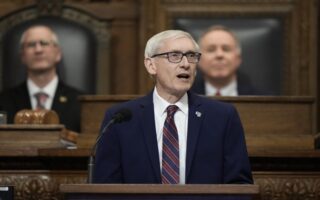Wisconsin Supreme Court weighs lame-duck arguments

MADISON, Wis. (AP) — Republicans tried to persuade the state Supreme Court on Monday to dismiss a union lawsuit challenging their contentious lame-duck laws, insisting during oral arguments that the measures don’t violate the separation of powers between the legislative and executive branches.
A coalition of labor unions filed a lawsuit in February alleging the laws blur the boundaries between the Legislature and Democratic Gov. Tony Evers and Attorney General Josh Kaul’s powers. The GOP’s attorneys have asked the Supreme Court to dismiss the case.
Republican legislators in December passed statutes designed to weaken Evers and Kaul’s powers before they took office. The laws prohibit Evers from ordering Kaul to withdraw from lawsuits, grant legislators the right to intervene in lawsuits rather than using Kaul’s state Justice Department lawyers, and force Kaul to get the Legislature’s Republican-controlled budget committee’s permission to settle lawsuits.
That last provision has been the most divisive. Kaul has insisted that settlement discussions are confidential and wants the budget committee members to sign nondisclosure agreements before he’ll update them on cases. The members have resisted, resulting in a bitter standoff that Kaul maintains has put tens of millions of dollars in potential settlement revenue in jeopardy.
Oral arguments went on for more than two hours and focused mostly on the laws’ effects on Kaul.
The GOP’s attorney, Misha Tseytlin, argued that the attorney general isn’t part of the executive branch and is instead a member of an “administrative branch.” He also insisted that the Legislature appropriates money so lawmakers should have a say in settlements to ensure Kaul doesn’t “settle away” the state’s interests.
Kaul told the justices that he believes the Legislature is free to join cases but cannot force the executive branch — in other words, his office — to act a certain way.
“That’s what violates the separation of powers,” Kaul said.
The unions face an uphill fight. Conservatives control the court 5-2, making it likely the justices will ultimately rule in Republicans’ favor and dismiss the lawsuit. Still, at least some members of the majority seemed skeptical about Tseytlin’s arguments on Monday.
Justice Dan Kelly said the Legislature can force the attorney general to “twiddle his thumbs all day long” but questioned where the power to settle lawsuits would land. Justice Annette Ziegler questioned how lawmakers can have any role in deciding litigation when the attorney general is the state’s lawyer. And Justice Rebecca Bradley noted that the court has never recognized a fourth branch of government.
Justice Rebecca Dallet, one of the court’s two-member liberal minority, said the laws give the Legislature the power to stop litigation, not just a role in settlement negotiations.
“That’s power to enforce the law,” she said to Tseytlin. “Where did you get that power?”
Tseytlin responded that Kaul could continue to litigate a case even if the Legislature blocked a settlement. He maintained both the Legislature and the attorney general can represent the state in court.
Democrats and liberal groups have spent the last year trying to push back against the laws with little success.
Liberal advocacy group One Wisconsin Now persuaded U.S. District Judge James Peterson in January to block provisions in the laws that restricted in-person early voting to the two weeks before an election. Peterson found the restrictions mirror early voting limitations he blocked two years earlier.
The League of Women Voters, Disability Rights Wisconsin and Black Leaders Organizing for Communities filed a separate lawsuit in January arguing the lame-duck legislative session was illegal because the regular legislative session had ended months earlier. The state Supreme Court stopped that lawsuit in June, ruling that legislators can meet whenever they want.
The state Democratic Party filed a lawsuit with Peterson in February arguing the laws were designed to retaliate against Evers’ supporters, violating free speech and equal protection guarantees. Peterson tossed that case in September, saying such arguments belong in state court.
___
Follow Todd Richmond on Twitter: https://twitter.com/trichmond1






